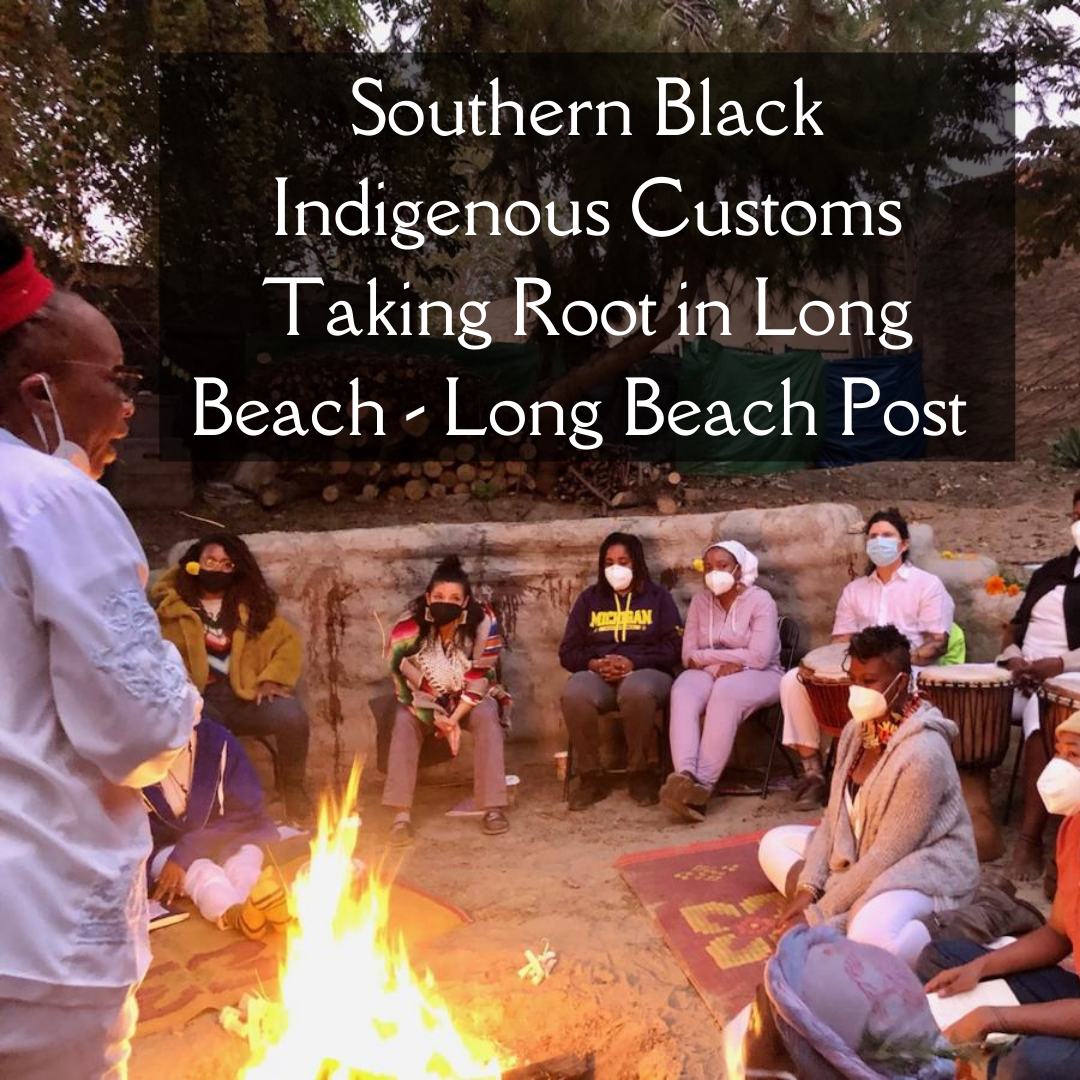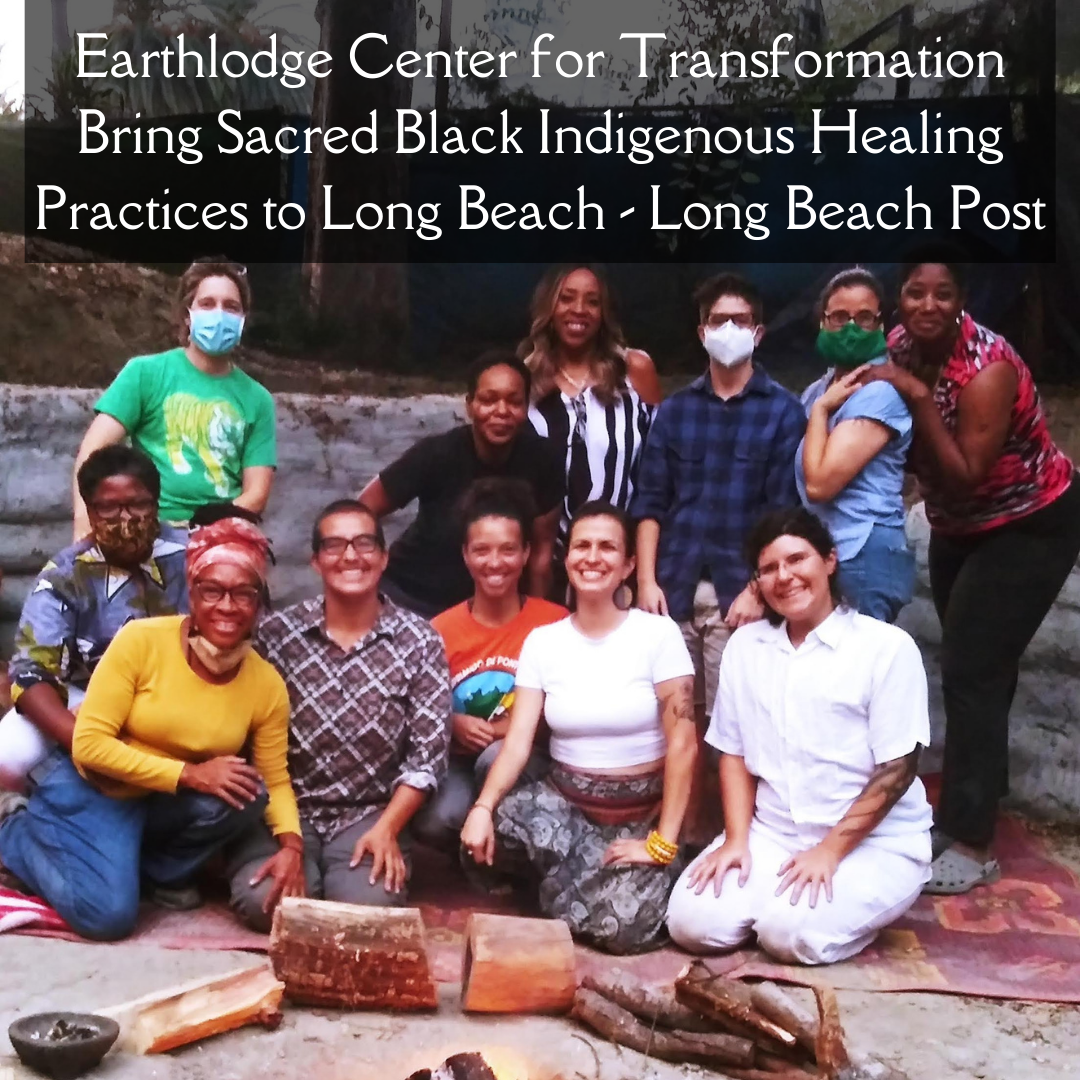Check out the Earthlodge in the Media!
Click below to bring you to each.
Press Releases
New Report: Recovery Far From Over for So Cal’s Black Workers, Who Detail Economic and Social Impact of COVID-19 Pandemic
February 28, 2022
For immediate release please contact Veena Hampapur, [email protected], (213) 370-9601 or Paulette Thornton, [email protected], (323) 401-0406
Essentials Stories Report Uncovers Challenges Faced by Black Workers During the Pandemic; Recommends Solutions for State Officials to Turn Around This Crisis
LOS ANGELES – A report released today by the Center for the Advancement of Racial Equity (CARE) at Work, at the UCLA Labor Center, is the first large-scale study of Black workers in Southern California, which is home to 60% of the Black population in the state. The report documents the challenges faced by nearly 2,000 Black workers in Los Angeles, San Bernardino, Riverside, and San Diego counties during the COVID-19 pandemic.
In the report, Essential Stories: Black Worker COVID-19 Economic Health Impact Survey, workers sound the alarm on the economic restructuring being felt on the ground as a result of the pandemic that emerged in Southern California. With heightened unemployment, underemployment, and unsafe conditions for a workforce plagued by a long history of systemic racism, researchers find that it will take a decade to address these critical issues if state officials do not intervene promptly.
According to the study, close to 70% of Black workers who lost their jobs or were furloughed during the pandemic have not been called back to work. More than half of Black workers surveyed worked in essential or frontline sectors pre-pandemic. Through their stories shared in the report, Black workers conveyed essential needs that will allow them and their communities to weather this crisis.
"Disproportionate health, economic, and housing discrimination have converged into a restructuring that will cause further unemployment and underemployment for Black workers, unless California’s recovery plans specifically address their needs," said Lola Smallwood-Cuevas, Director of CARE at Work. "It is important to remember that after the Great Recession, it took 13 years for Black unemployment to lower back to pre-recession levels. To have a prompt and meaningful economic recovery this time, Black workers need relief, resources, and programming tailored to their needs."
The report finds that as Black workers have navigated overlapping economic and health crises during the pandemic, there has been insufficient systemic support available and accessible to them. 71% of on-site workers were concerned about COVID-19 exposure on the job. A third of workers reported uncertainty that they could afford food in the next month.
"Most workers reported low compliance with COVID-19 safety regulations at work, and only 20% were aware of the California Division of Occupational Safety and Health’s (Cal/OSHA) COVID-19 notification requirements," said Déjà Thomas, Program Manager at CARE at Work. "On top of that, almost half of workers who experienced prejudice or discrimination at work during the pandemic were pushed out of their jobs."
Meriel Anderson-McDade, who works as an employment placement coordinator for a community college, expressed her frustration about workplace discrimination that she experienced when she received an unwarranted poor performance evaluation by her supervisor during the pandemic. "My white colleagues, evaluated by the same supervisor, said they got a perfectly fine evaluation," said Anderson-McDade. "A lot of times, you’re not valued because of the color of your skin."
Researchers note that inadequate care infrastructure – both in the workplace and within local, state, and federal emergency support – has created a state of emergency for Black workers. A total of 90% percent of Black women surveyed had an increase in at-home and financial responsibilities during the pandemic, and many of their employers were inflexible in accommodating their needs.
"The Black workers we surveyed are facing high levels of stress," said report author Demetria Murphy. "80% of Black workers rated their stress level as three or more on a scale of one to five. And what is even more concerning is that most Black women rated their stress level at a four or five."
One Black worker who experienced undue stress from an inflexible employer is Shekinah Pitts, who shared her experience with erratic employment as an area manager for a food service company. "During the pandemic, I was furloughed – four months on, two months off. And then I was furloughed again for another four months," said Pitts. "And [we] were forced to use our paid time off as opposed to being allowed to file for unemployment. So all my time that I had saved up, I had to use that first."
In response to the concerns of Black workers surveyed in the report and a subsequent exhaustive research analysis, the report offers the following key recommendations:
● Long-term quality jobs, economic support, and COVID-19 recovery programming
● Black worker wellness support through targeted programming
● Direct workforce rights training and development programming
In order for the current economic restructure to lead to an equitable recovery, researchers emphasize the importance of amplifying the voices of Black workers. These recommendations have been further summarized in the report in context of regional, state, and federal labor policies.
Download the report: bit.ly/EssentialStoriesCARE
**Please contact Veena Hampapur or Paulette Thornton to schedule interviews.**
The Center for the Advancement of Racial Equity at Work (CARE at Work) engages Black workers and economic justice advocates and facilitates innovative solutions that address the needs of Black working-class people. Through a school-to-movement pathway of service, teaching, capacity-building, and research, our purpose is to reveal conditions of Black work in Southern California under global racial capitalism and model approaches for change.
The UCLA Labor Center believes that a public university belongs to the people and should advance quality education and employment for all. Every day we bring together workers, students, faculty, and policymakers to address the most critical issues facing working people today. Our research, education, and policy work lifts industry standards, creates jobs that are good for communities, and strengthens immigrant rights, especially for students and youth.
For immediate release please contact Veena Hampapur, [email protected], (213) 370-9601 or Paulette Thornton, [email protected], (323) 401-0406
Essentials Stories Report Uncovers Challenges Faced by Black Workers During the Pandemic; Recommends Solutions for State Officials to Turn Around This Crisis
LOS ANGELES – A report released today by the Center for the Advancement of Racial Equity (CARE) at Work, at the UCLA Labor Center, is the first large-scale study of Black workers in Southern California, which is home to 60% of the Black population in the state. The report documents the challenges faced by nearly 2,000 Black workers in Los Angeles, San Bernardino, Riverside, and San Diego counties during the COVID-19 pandemic.
In the report, Essential Stories: Black Worker COVID-19 Economic Health Impact Survey, workers sound the alarm on the economic restructuring being felt on the ground as a result of the pandemic that emerged in Southern California. With heightened unemployment, underemployment, and unsafe conditions for a workforce plagued by a long history of systemic racism, researchers find that it will take a decade to address these critical issues if state officials do not intervene promptly.
According to the study, close to 70% of Black workers who lost their jobs or were furloughed during the pandemic have not been called back to work. More than half of Black workers surveyed worked in essential or frontline sectors pre-pandemic. Through their stories shared in the report, Black workers conveyed essential needs that will allow them and their communities to weather this crisis.
"Disproportionate health, economic, and housing discrimination have converged into a restructuring that will cause further unemployment and underemployment for Black workers, unless California’s recovery plans specifically address their needs," said Lola Smallwood-Cuevas, Director of CARE at Work. "It is important to remember that after the Great Recession, it took 13 years for Black unemployment to lower back to pre-recession levels. To have a prompt and meaningful economic recovery this time, Black workers need relief, resources, and programming tailored to their needs."
The report finds that as Black workers have navigated overlapping economic and health crises during the pandemic, there has been insufficient systemic support available and accessible to them. 71% of on-site workers were concerned about COVID-19 exposure on the job. A third of workers reported uncertainty that they could afford food in the next month.
"Most workers reported low compliance with COVID-19 safety regulations at work, and only 20% were aware of the California Division of Occupational Safety and Health’s (Cal/OSHA) COVID-19 notification requirements," said Déjà Thomas, Program Manager at CARE at Work. "On top of that, almost half of workers who experienced prejudice or discrimination at work during the pandemic were pushed out of their jobs."
Meriel Anderson-McDade, who works as an employment placement coordinator for a community college, expressed her frustration about workplace discrimination that she experienced when she received an unwarranted poor performance evaluation by her supervisor during the pandemic. "My white colleagues, evaluated by the same supervisor, said they got a perfectly fine evaluation," said Anderson-McDade. "A lot of times, you’re not valued because of the color of your skin."
Researchers note that inadequate care infrastructure – both in the workplace and within local, state, and federal emergency support – has created a state of emergency for Black workers. A total of 90% percent of Black women surveyed had an increase in at-home and financial responsibilities during the pandemic, and many of their employers were inflexible in accommodating their needs.
"The Black workers we surveyed are facing high levels of stress," said report author Demetria Murphy. "80% of Black workers rated their stress level as three or more on a scale of one to five. And what is even more concerning is that most Black women rated their stress level at a four or five."
One Black worker who experienced undue stress from an inflexible employer is Shekinah Pitts, who shared her experience with erratic employment as an area manager for a food service company. "During the pandemic, I was furloughed – four months on, two months off. And then I was furloughed again for another four months," said Pitts. "And [we] were forced to use our paid time off as opposed to being allowed to file for unemployment. So all my time that I had saved up, I had to use that first."
In response to the concerns of Black workers surveyed in the report and a subsequent exhaustive research analysis, the report offers the following key recommendations:
● Long-term quality jobs, economic support, and COVID-19 recovery programming
● Black worker wellness support through targeted programming
● Direct workforce rights training and development programming
In order for the current economic restructure to lead to an equitable recovery, researchers emphasize the importance of amplifying the voices of Black workers. These recommendations have been further summarized in the report in context of regional, state, and federal labor policies.
Download the report: bit.ly/EssentialStoriesCARE
**Please contact Veena Hampapur or Paulette Thornton to schedule interviews.**
The Center for the Advancement of Racial Equity at Work (CARE at Work) engages Black workers and economic justice advocates and facilitates innovative solutions that address the needs of Black working-class people. Through a school-to-movement pathway of service, teaching, capacity-building, and research, our purpose is to reveal conditions of Black work in Southern California under global racial capitalism and model approaches for change.
The UCLA Labor Center believes that a public university belongs to the people and should advance quality education and employment for all. Every day we bring together workers, students, faculty, and policymakers to address the most critical issues facing working people today. Our research, education, and policy work lifts industry standards, creates jobs that are good for communities, and strengthens immigrant rights, especially for students and youth.
CALIFORNIA COMMUNITY FOUNDATION ANNOUNCES INAUGURAL BLACK EMPOWERMENT FUND GRANTEES
The grants which were made possible by a $1M gift from Facebook, will fund long-term infrastructure of Black-led and Black-empowering organizations throughout Los Angeles County.
July 22, 2021
For immediate release please contact Paula Valle Castanon [email protected] (213) 452-6233, (323) 253-6431 (cell)
Los Angeles, Calif. - The California Community Foundation (CCF) announced today the inaugural cohort of 20 community-based organizations that will receive $1 million in grants through the Black Empowerment Fund. The grants, which were made possible by Facebook, will support organizations that work to strengthen the leadership pipeline, build wealth, change the media narrative, advance system reform, develop a conduit for research and intellectual advancement, and empower Black voices within the Black community.
CCF launched the Black Empowerment Fund in February 2021 to invest in the long-term infrastructure of Black-led and Black-empowering organizations throughout Los Angeles County. The 20 organizations that have been selected, in collaboration with the Black Equity Collective, represent dynamic leaders that develop transformational, community centered solutions for the Black community, and create conditions for the Black community to achieve their full potential for self-actualization and social and economic prosperity.
"Facebook is supporting the Black Empowerment Fund to help counter the social and economic challenges faced by the Black community by dismantling systemic barriers to opportunity and expanding access to resources through online trainings and technical and financial support," said Alex Bashian, Strategic Partnerships Manager for Facebook Los Angeles. "We hope these grants will increase access to jobs, workforce development, and career coaching to support economic growth in the local community."
Among the recipients of the Black Empowerment Fund grants is Project Joy Inc., which works to empower, educate, and encourage the most vulnerable youth and families. This grant will directly impact youth, who will be able to participate in programs like Youth AI (artificial intelligence) Career Learning Program, which increases confidence, mental wellness, job readiness and career awareness. The funding and training will also enable them to grow their social enterprise, Project Joy Media, and offer digital marketing services to the hardest hit business owners in the community enabling them to tell their unique stories by providing critical media support.
"We are elated at the support and exposure that is offered by this grant," said Kim Watson, Founder and Executive Director of Project Joy Inc. "The funding, training and increased visibility is a springboard; allowing us to create jobs, sustain life changing programs, increase joy and deepen our career services to the youth and families in our community."
CCF has an established record of investing in the Black community to build greater community resiliency through programs like BLOOM, LASIF-YMOC, PAT, and Ready to Rise. This Fund is the next step in CCF’s evolution from resiliency support to long-term infrastructure investments, with the focus being on improving the social and economic outcomes to empower Black communities throughout Los Angeles County.
The Black Cooperative Investment Fund (BCIF), also among the Fund’s recipients, plans on using the grant to positively impact the Black community, by deploying low to no interest loans to Black-owned businesses. BCIF’s role in the ecosystem is to create jobs, build assets, improve chances for economic mobility in the community, and address the racial wealth gap.
"BCIF is laser focused on pooling dollars and raising awareness about the importance of economic empowerment, equity, and wealth building in the Black community," said Robert Lewis, President and Board Chair of the Black Cooperative Investment Fund. "BCIF believes the Black community can get the change it seeks when it impacts the bottom line of corporations, politicians, and systems that take advantage of our 'blind loyalty.' As such, being an action-oriented partner within the ecosystem of efforts to close the racial wealth gap is paramount for BCIF."
It is by resourcing and empowering our communities to address the root causes of systemic issues and persistent barriers, which will create lasting changes in our communities.
"CCF is committed to working with our leaders and community to invest and empower individuals and organizations that are developing responsive solutions to address the root causes of racism and disinvestment, which have disproportionately impacted Black communities," said Antonia Hernández, President and CEO of the California Community Foundation. "We know that inequalities in education, health, civil rights and housing require investment in the capacity of people and communities in order to bring about real change, which is why we are thrilled to have partnered with Facebook and the Black Equity Collective to provide needed resources to our grantees."
Queen, the Founder of the EarthLodge Center for Transformation, a Black-led spiritual sanctuary centering LGBTQI, women, youth, their families, and allies, stated: "This grant will allow us to expand our healing justice and trauma transformation work at a vital time as the world works to recover from the global pandemics of COVID and anti Black violence. The rates of depression, isolation, violence and emotional distress, especially in the LGBTQI community, reached all-time highs since last March and the support of these funds will help us to continue to provide tools for healing, balance, wellness, community safe space and sanctuary to our marginalized communities… so that we can all experience a just recovery and healthier new world."
The California Community Foundation (CCF) has served as a public, charitable organization for Los Angeles County since 1915. Its mission is to lead positive systemic change that strengthens Los Angeles communities. CCF stewards $2.4 billion in assets and manages 1,700 charitable foundations, funds and legacies. For more information, please visit www.calfund.org.
For more information about the Black Empowerment Fund please visit: https://www.calfund.org/black-empowerment-fund/
For immediate release please contact Paula Valle Castanon [email protected] (213) 452-6233, (323) 253-6431 (cell)
Los Angeles, Calif. - The California Community Foundation (CCF) announced today the inaugural cohort of 20 community-based organizations that will receive $1 million in grants through the Black Empowerment Fund. The grants, which were made possible by Facebook, will support organizations that work to strengthen the leadership pipeline, build wealth, change the media narrative, advance system reform, develop a conduit for research and intellectual advancement, and empower Black voices within the Black community.
CCF launched the Black Empowerment Fund in February 2021 to invest in the long-term infrastructure of Black-led and Black-empowering organizations throughout Los Angeles County. The 20 organizations that have been selected, in collaboration with the Black Equity Collective, represent dynamic leaders that develop transformational, community centered solutions for the Black community, and create conditions for the Black community to achieve their full potential for self-actualization and social and economic prosperity.
"Facebook is supporting the Black Empowerment Fund to help counter the social and economic challenges faced by the Black community by dismantling systemic barriers to opportunity and expanding access to resources through online trainings and technical and financial support," said Alex Bashian, Strategic Partnerships Manager for Facebook Los Angeles. "We hope these grants will increase access to jobs, workforce development, and career coaching to support economic growth in the local community."
Among the recipients of the Black Empowerment Fund grants is Project Joy Inc., which works to empower, educate, and encourage the most vulnerable youth and families. This grant will directly impact youth, who will be able to participate in programs like Youth AI (artificial intelligence) Career Learning Program, which increases confidence, mental wellness, job readiness and career awareness. The funding and training will also enable them to grow their social enterprise, Project Joy Media, and offer digital marketing services to the hardest hit business owners in the community enabling them to tell their unique stories by providing critical media support.
"We are elated at the support and exposure that is offered by this grant," said Kim Watson, Founder and Executive Director of Project Joy Inc. "The funding, training and increased visibility is a springboard; allowing us to create jobs, sustain life changing programs, increase joy and deepen our career services to the youth and families in our community."
CCF has an established record of investing in the Black community to build greater community resiliency through programs like BLOOM, LASIF-YMOC, PAT, and Ready to Rise. This Fund is the next step in CCF’s evolution from resiliency support to long-term infrastructure investments, with the focus being on improving the social and economic outcomes to empower Black communities throughout Los Angeles County.
The Black Cooperative Investment Fund (BCIF), also among the Fund’s recipients, plans on using the grant to positively impact the Black community, by deploying low to no interest loans to Black-owned businesses. BCIF’s role in the ecosystem is to create jobs, build assets, improve chances for economic mobility in the community, and address the racial wealth gap.
"BCIF is laser focused on pooling dollars and raising awareness about the importance of economic empowerment, equity, and wealth building in the Black community," said Robert Lewis, President and Board Chair of the Black Cooperative Investment Fund. "BCIF believes the Black community can get the change it seeks when it impacts the bottom line of corporations, politicians, and systems that take advantage of our 'blind loyalty.' As such, being an action-oriented partner within the ecosystem of efforts to close the racial wealth gap is paramount for BCIF."
It is by resourcing and empowering our communities to address the root causes of systemic issues and persistent barriers, which will create lasting changes in our communities.
"CCF is committed to working with our leaders and community to invest and empower individuals and organizations that are developing responsive solutions to address the root causes of racism and disinvestment, which have disproportionately impacted Black communities," said Antonia Hernández, President and CEO of the California Community Foundation. "We know that inequalities in education, health, civil rights and housing require investment in the capacity of people and communities in order to bring about real change, which is why we are thrilled to have partnered with Facebook and the Black Equity Collective to provide needed resources to our grantees."
Queen, the Founder of the EarthLodge Center for Transformation, a Black-led spiritual sanctuary centering LGBTQI, women, youth, their families, and allies, stated: "This grant will allow us to expand our healing justice and trauma transformation work at a vital time as the world works to recover from the global pandemics of COVID and anti Black violence. The rates of depression, isolation, violence and emotional distress, especially in the LGBTQI community, reached all-time highs since last March and the support of these funds will help us to continue to provide tools for healing, balance, wellness, community safe space and sanctuary to our marginalized communities… so that we can all experience a just recovery and healthier new world."
The California Community Foundation (CCF) has served as a public, charitable organization for Los Angeles County since 1915. Its mission is to lead positive systemic change that strengthens Los Angeles communities. CCF stewards $2.4 billion in assets and manages 1,700 charitable foundations, funds and legacies. For more information, please visit www.calfund.org.
For more information about the Black Empowerment Fund please visit: https://www.calfund.org/black-empowerment-fund/







